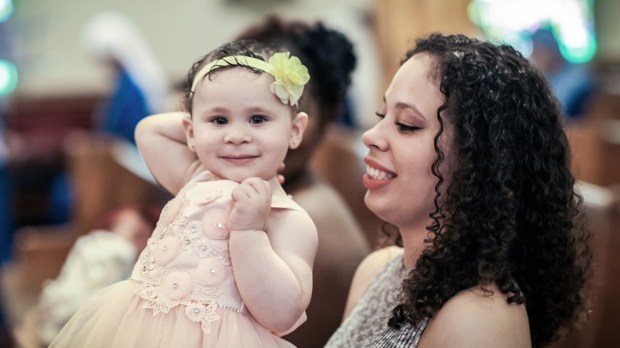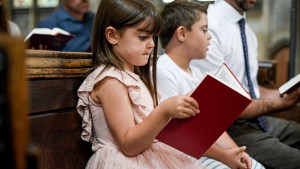It was a Holy Day of Obligation and my husband was at work, so there was no one to help me at Mass with our three kids, then ages 4, 2, and newborn. I didn’t just “have” to be at Mass; I wanted to be there. I wanted my children to know that we go to Mass because we love Jesus, because we want to be with Him, and that their mommy has been taking them to see Jesus since they were little.
This was during Chicago’s infamous “polar vortex” winter, and I wanted so much to be at Mass that day that I spent over two hours preparing for it: feeding the baby, dressing them all, changing diapers, packing up the diaper bag with water bottles and coloring books, bundling them in boots and hats and snowsuits, turning on the car so it would be warm for them, scraping ice off the windshield, carrying each child to the car one-by-one through the snowy depths, buckling each one into their car seat.
One challenge after another
At last, we were ready, and we drove to a church near our home instead of our parish which is farther away. But despite the hours of preparation, we were still a few minutes late and at first I couldn’t find a seat. Finally we slid past someone to the middle of a pew. With the baby in a front-pack carrier, and a bag full of quiet activities, I prayed to make it through Mass without incident.
Then came the dreaded moment during the homily: my four-year-old announced in a loud whisper, “I need to pee!” The restroom at that church is located next to the sanctuary, so we made our way out of the pew and all the way to the front of church. No aisle has ever felt longer. It felt as though every person in the church was staring at us, the two little ones clinging to my hands and trying to run ahead, the floppy newborn sleeping on my chest.
We were almost at the front when my two-year-old tripped and fell, hitting the ground hard. Entirely indifferent to anyone around us, she did what any toddler would do, and lay on the ground howling at top volume. My four-year-old, meanwhile, was intent on his goal and tried to bolt toward the restrooms. I struggled to pick up the two-year-old, which woke the baby, who joined in the sobbing. I didn’t have enough hands for all three of them, and feeling desperate and trapped, I began to feel hot tears welling up in my eyes.
“How can I help?”
Just then an older woman came up beside me and mercifully whispered, “How can I help?” She gently lifted the howling toddler and together we got the children to the bathroom, and then back to the pew. The rest of Mass went more smoothly.
I was so grateful for that kind lady, especially given that hard experience has shown me that compassion and sympathy are not always what young families find when they go to Mass.
The most difficult part of taking kids to Mass
It is incredibly hard to take little ones to church: the hours of preparation, juggling their various needs, and trying to keep them quiet and (mostly) still for an entire hour when every bone in their little bodies aches to run and jump and tumble and shout. But the hardest part of taking children to Mass isn’t actually the children — it’s the judgment of others.
Taking kids to Mass is hard enough without the rest of the congregation making it worse. If you are irritated by the behavior of a little child at Mass, I can assure you that it is bothering the parent infinitely more.
So this Sunday, challenge yourself with this question: How can I encourage a parent of young children to keep coming to Mass in this difficult season? What can I do to make them feel welcome here? How can I live out Christ’s command to “Let the little children come to me, and do not hinder them, for the kingdom of heaven belongs to such as these”?
Tips to help families who bring small kids to Mass
Here are a few things you might do to help:
- If a parent is at Mass alone and seems to be really struggling, consider asking, “How can I help?”
- After Mass, say something like, “I know it’s so hard bringing little ones to Mass. Thank you for bringing them. You’re doing a wonderful job. I love seeing your children here at our church.”
- If your parish has the infrastructure, a really amazing ministry would be matching up older “helpers” with families who have little ones and need an extra hand.
- No matter how good your intentions are, never give criticism or negative feedback to a family about their kids. Many children have invisible disabilities (autism, ADHD, sensory processing disorder, anxiety, etc.), and while their behavior may look inappropriate to you, there may be very good reasons for what they and their families are doing. You never know what families are dealing with, so follow the old adage: “If you don’t have something nice to say, don’t say anything at all.”
- If a baby throws a toy under your pew, hand it back with a smile.
- Encourage your pastor to mention during the homily or announcements that little ones are welcome, that it’s a family-friendly parish.
- If you don’t have small children, don’t sit in the cry room; leave it accessible for families who may need it.
- As temptingly cute as little ones may be, don’t touch them without asking; many little ones may be shy or get upset, and don’t want a high-five or head pat.
- If a family comes to sit in your pew, slide to the middle of the pew instead of sitting on the end, so that they don’t have to climb over you to take their kids to the bathroom or remove a crying baby.
- Talk to your priest about providing a changing table in the bathroom and a shelf of children’s books for families to borrow during Mass.
Let’s work together
What would happen if everyone who doesn’t have young kids rallied to help young families? I know one thing would happen: A lot more young families would feel supported and would want to come back.
I’ve heard it said that “If the Church ain’t cryin’, it’s dyin’.” It might not seem like it right now, but that screaming toddler in the back is the future of our Church, the one who will be serving and teaching future Catholics. If there are no children in the church today, in a few years there will be no priests and no adults in the pews. Let’s work together to build a Church that is more welcoming of children and young families, who in turn will build up our Church for generations to come.



